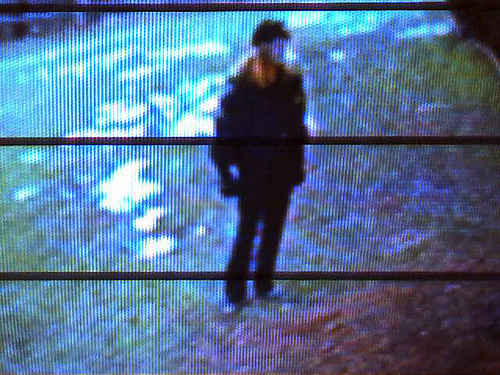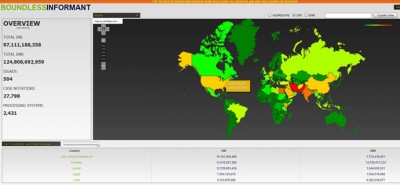
I start with a nota bene by saying that I do not self-identify as a “surveillance scholar” but given our current sociotechnical and political climates, the topic is unavoidable. One might even be tempted to say that if you aren’t thinking about state and corporate surveillance, you’re missing a key part of your analysis regardless of your object of study. Last week, Whitney Erin Boesel put out a request for surveillance study scholars to reassess the usefulness of the panopticon as a master metaphor for state surveillance. Nathan Jurgenson commented on the post, noting that Siva Vaidhyanathan (@sivavaid) has used the term “nonopticon” to describe “a state of being watched without knowing it, or at least the extent of it.” I would like to offer up a different term –taken straight from recent NSA revelations—that applies specifically to surveillance that relies on massive power differentials and enacted through the purposeful design of the physical and digital architecture of our augmented society. Nested within the nonopticon, I contend, are billions of “boundless informants.”
Boundless Informant is the part of the NSA that analyzes the data brought in through another recently revealed program called PRISM. It sniffs out trends and linkages by, according to The Guardian’s Greenwald and MacAskill, “counting and categorizing the records of communications, known as metadata, rather than the content of an email or instant message.”

First, I want to make a clear distinction between Boundless Informant (upper case) the NSA program and boundless informant (lower case) the metaphor. Unlike the Bentham/Foucault panopticon, Boundless Informant really does monitor everyone. That might make it seem too literal (and too soon) to use as a metaphor for digitally augmented state surveillance, but I think that makes it perfect. Thanks to recent leaks and excellent reporting, we know Boundless Informant exists, but we don’t really know how it works or what role its played in past events. The boundless informant is half boogeyman and half Orwellian police state. The true evil genius of boundless informant is that it makes Alex Jones conspiracy theories feel dangerously possible. It makes you wonder who’s seen your Dropbox files and why the MPAA hasn’t come after you for all those Game of Thrones episodes you pirated. Boundless informant as a metaphor stands for the secret and arbitrary use of power based on the limitless capacity to collect and subsequently analyze data.
The power of Boundless Informant comes from its position high “above” our planetary information networks. From the NSA’s vantage point one gets exclusive access to a map of 21st century geopolitics. It shows the geometry and acceleration of the world’s burgeoning nonstate political networks: The thousands of decentralized, global sociotechnical systems that topple dictators and occupy city centers are difficult to see and even harder to infiltrate. An individual becomes a boundless informant by using the products and services that fall under the purview of the state’s PRISM. The state creates boundless informants through the perfection of digital monitoring systems, studying the collection and interpretation of biological evidence, and human terrain mapping. These are the same ordered bodies that Foucault saw as ensnarled in capillaries of power. Even the most finely tuned body gestures and digitally mediated social interactions are studied and catalogued for later analysis.
Describing people as boundless informants should be used to highlight the way individuals unknowingly give up crucial information to powerful actors. The boundless informant does this through customer loyalty cards and connected social media accounts, but mainly through the metadata of how, when, and where those services are utilized. The boundless informant is unable to opt out because to do so would mean to live outside of a sovereign nation. There are degrees to which one can reduce their connections—living “off the grid”—but unless one is willing to live a hard subsistence life there are few means of doing this meaningfully. Moreover, those that rely on computerized state services— Medicaid, SNAP, public transit—are the easiest to track and monitor. To invoke the boundless informant is to call attention to the way powerful actors nonconsensually extract data from populations through the design of everyday life.
Unlike the panopticon, which requires prisoners to know how (but not when) they are being watched, the systems that produce boundless informants are distributed and ultimately unseeable in their totality by any one individual. And unlike the nonopticon, the creation of the boundless informant requires actively obscuring and hiding the tools of surveillance. In fact, knowledge of the modes of watching is grounds for severe prosecution. Power no longer resides in a central tower (physical or cognitive) or in the ignorance of the masses, but in the deliberately opaque, countless and unremarkable black boxes that make up the physical, digital, and cognitive landscape of the network society. Watching must be so pervasive that to point out that one has internalized its gaze is a prosaic–almost naïve–concept that scares no one. The cultural shift is startlingly fast. Just 20 years after their creation the X-Files’ famous dual taglines The Truth is Out There and Government Denies Knowledge are absolutely quaint.
The boundless informant is the state’s ruthlessly logical and genius solution to controlling a world shot through with actor-networks and object oriented ontologies. The program so perfectly matches the recent trends in contemporary philosophy (it’s the connections that matter, not the nodes) that one can easily imagine a row of NSA cubicles filled with books by Bruno Latour and Graham Harman.

For the past 500 years, empires have sustained their prominence by shifting from the dominant player in industry and trade, to being the very medium of those transactions.[1] The United States has done this two fold by not only establishing its war debt (aka U.S. treasury bonds) as a global reserve currency, but by also playing host to a majority of the world’s communications. While a velvet-gloved iron fist still works, it is less obvious (and therefore much more difficult to defy in a way that garners sympathy or solidarity) to command a billion little straws constantly sipping at the world’s collective conversation. The result is a vast treasure-trove of blackmail and ammunition for social movement sabotage.
Finally, (B)boundless (I)informant invokes how much each one of us are implicated in our own surveillance. Everything from our willingness to (pro)actively share our most intimate moments[2] to professionals’ fetishization of Big Data feed into digitally augmented, decentralized state surveillance. Boundless informants are “boundless” in two senses: the information never seems to stop flowing, and the very boundaries of their identy are porus and emergent. The name captures the vast quantities of data that any single self-quantified citizen can provide to powerful entities. Informants are, even if somewhat begrudgingly, willing parties to investigations they do not fully understand and do not have control over. Think of the police informant in crime procedurals (or the X Files!): torn between their concerned for the safety and protection of themselves and their loved ones, and the largely imperfect administration of justice and search for truth. The boundless informant has ambiguous motives and may have his or her data extorted or manipulated out of their hands. They may provide information not knowing that it will be used against their compatriots or themselves.
We are boundless informants when powerful actors can record and analyze our texts to loved ones, our account logins, and our GPS markers. Not because of the content of those actions, but because of their relationship to one-another and our relationships to fellow humans. The boundless informant can be said to be within the nonopticon—that is they do not know they are being watched—but more importantly they enable this unseen watching just by going about their everyday life. We are constantly shedding bits and data points along with our hair and finger prints. We cannot help but leave a trail.
[1] This observation was first made by the economist Giovanni Arrighi and has since been picked up by David Graeber and other activists as a point of departure for critiquing Wall Street’s “mafia capitalism.” See The Democracy Project by David Graeber (2013) page 104.
[2] I was hesitant to make even an oblique reference to the click bait-inspired “death of privacy” meme but ultimately decided that no matter the individuals’ privacy setting savy, state surveillance programs are able to capture it all. Additionally, most research suggests we are more actively concerned with “social surveillance” –family and friends seeing private information– than the kind of watching done by governments or private corporations.

Comments 4
In Their Words » Cyborgology — June 15, 2013
[...] “To invoke the boundless informant is to call attention to the way powerful actors nonconsensually ex...” [...]
NSA’s Boundless Informant — June 24, 2013
[...] Boundless Informant: Augmented State Surveillancehttp://thesocietypages.org/cyborgology/2013/06/14/boundless-informant-augmented-state-surveillance/I start with a nota bene by saying that I do not self-identify as a “surveillance scholar” but given our current sociotechnical and political climates, the topic is unavoidable. One might even be… Meet ‘Boundless Informant,’ the NSA’s Secret Tool for Tracking Global Surveillance Datahttp://www.theatlantic.com/technology/archive/2013/06/meet-boundless-informant-the-nsas-secret-tool-for-tracking-global-surveillance-data/276686/According to a snapshot of a Boundless Informant heatmap that Greenwald and MacAskill obtained, which assigns each nation a color code based on how extensively it is subjected to NSA surveillance,… [...]
The Perfect Place: What’s Really Disturbing About Retailer’s Tracking Your Every Move » Cyborgology — July 17, 2013
[...] idea of surveillance. Rather, now it is widely known that the government has built a system that turns us into boundless informants incapable of keeping a secret so long as we come within reach of a networked device, willingly or [...]
New Year’s Spectacle » Cyborgology — January 4, 2014
[…] it be through corporate research, for which I am a kind of boundless informant; or my own deep desire to watch the ball drop on New Year’s Eve (I always feel its absence if the […]